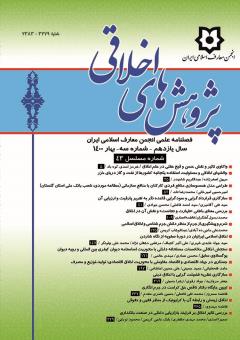چالشهای اخلاقی و مسئولیت استفاده یکجانبه کشورها از نفت و گاز دریای خزر
محورهای موضوعی : Ethics and Islamic Educationسهیل اصغرزاده اسفندی 1 , عبدالکریم شاحیدر 2
1 - مرکز تحصیلات تکمیلی پیام نور
2 - دانشگاه پیام نور، تهران
کلید واژه: نفت و گاز دریای خزر, منابع مشترک, رویه قضایی, معاهدات دریای خزر, کنوانسیون آکتائو.چالشهای اخلاقی,
چکیده مقاله :
با فروپاشی شوروی، ایران در حوزه دریای خزر با همسایگان جدیدی روبه رو شد که هیچ یک در عمل قصد پایبندی به تعهدات کشور پیشین خود را نداشته و این امر هم از جنبه اخلاقی و هم از لحاظ قواعد حقوق بین الملل مورد توجه است. در این میان نحوه بهره برداری از منابع بستر و زیر بستر دریا یکی از مسائل بدون راه حل باقی مانده، کما اینکه در کنوانسیون اخیر رژیم حقوقی دریای خزر در آکتائو نیز توافقی در خصوص تقسیم بستر و زیر بستر دریا صورت نگرفته است.صرف نظر از اینکه خزر را دریا بدانیم یا دریاچه ،قواعد حقوق بین الملل از جمله رویه عملی کشورها و آرای محاکم بین المللی و دکترین، استفاده یک جانبه کشورها از منابع نفت و گاز این پهنه آبی را تایید نمیکنند و تصریح کنوانسیون مذکور به لزوم حصول توافق جداگانه در خصوص بستر و زیر بستر، خود موید لزوم توافق همه جانبه بین کشورها بوده اما آنچه در عمل مشاهده میشود بهره برداری کشورهای حاشیه خزر از این منابع بدون درنظر گرفتن منافع سایر کشورهاست و در این میان کشور ما منفعل ترین موضع را دارد. آنچه مسلم است کشورهای حاشیه دریای خزر میباید با استفاده از اصول حقوق بین الملل و تغییرات جدید ژئوپلوتیک و توافق همه جانبه در خصوص منابع نفت و گاز آن تعیین تکلیف نمایند اما تا پیش از رسیدن به این مهم، استفاده یک جانبه از این منابع از منظر حقوق بین الملل مجاز نبوده و موجد مسئولیت بین المللی است که خود متاثر از اخلاق در سطح بین الملل میباشد.
After the collapse of the Soviet Union, Iran faced with new neighbors in this region; the neighbors who actually had no intention to adhere to their previous country’s commitments and this issue is important in ethic and international rules aspects. However, the exploitation of the seabed and under seabed reserves of the Caspian Sea has been among the unsolved problems yet. Furthermore, no agreement has been made about sharing such resources in the recent convention in Aktau. Despite considering Caspian as a sea or lake, the principles of international law like procedures of the countries and the principles of the international trials and doctrines do not confirm any unilateral use of gas and oil resources of this sea by the countries; on the other hand, the mentioned convention emphasizes the requirement of making a separate agreement about the seabed and under seabed resources of this sea which also suggests the requirement of making a comprehensive agreement among these countries. Nevertheless, what is actually observed is the exploitation of these resources by all countries bordering the Caspian Sea without considering the benefits of the other countries. In this regard, Iran has the most passive position. It is obvious that the countries in the Caspian border shall determine their objectives by applying the principles of international law and new geopolitical changes and make a comprehensive agreement about oil and gas resources. Before considering this significant affair, a comprehensive use of these resources is not allowed based on the international law and will arise international liability that is affected from universal ethics.
